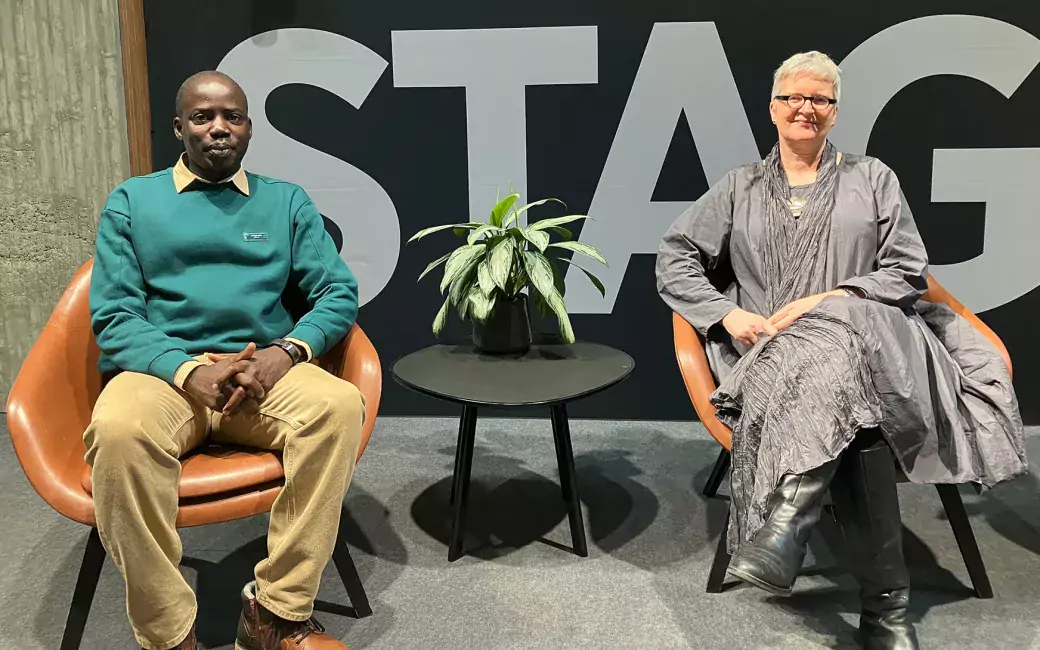Jules Mansaly, a Senegalese author with a PhD in linguistics, was awarded a grant for spring 2023 under the University of Helsinki's Africa mobility programme.

Mansaly's passion is writing.
"By writing, I connect my researcher identity to my lived experiences. Knowledge about Africa is still often created by outsiders, on the basis of Eurocentric notions and colonialism," says Mansaly, who goes by the pen-name Jules Ndotty.
Mansaly's writing is not limited to specific themes or geographical areas. Rather, it encompasses several spaces.
"For instance, my latest book focuses on the Covid experience."
A learning and book centre in Samine
According to Mansaly, books remain viable and powerful tools that support learning about, preparing for and facing the diverse challenges of humanity.
As a cultural activist, Mansaly has established a learning and book centre in Samine, a border town between Senegal and Guinea-Bissau. The centre is aimed at providing local residents with access to books and developing multilingual literacy skills among teachers and pupils.
A research visit to African studies at the City Centre Campus
Jules Mansaly was admitted to the new Africa Early Career Mobility Programme at the University of Helsinki.
During his visit to Finland until the end of May 2023, Mansaly is collaborating with Professor of African Studies Friederike Lüpke. Together they are cultivating project ideas related to multilingualism in education, particularly teaching and learning methods in multilingual environments.
During his visit, Mansaly will give lectures on his research and authorship.
"In addition, Professor Lüpke and I are working on a grant application for a multilingual education project encompassing Mali, the Gambia and Senegal, in cooperation with the University of the Gambia, the UNESCO office in Mali and the LILIEMA association in Senegal. We focus on teacher training and inclusive multilingual teaching in these extremely multilingual West African countries, but also in Finland," Mansaly says.
What is LILIEMA?
Together with local activists as well as researchers from Senegal and Europe, Friederike Lüpke has designed a teaching and learning programme entitled Language-independent literacies for inclusive education in multilingual areas LILIEMA, which can be adapted to any multilingual environment.
In Mali and the Gambia, school curricula have featured bilingual and multilingual teaching, offering some of the country's national languages in addition to the official languages (English in the Gambia and French in Mali) dating back to colonialism.
"We want to develop ways to include these languages and multilingualism in school curricula. At the moment, teachers are not trained in the national languages they teach or in multilingual education, nor have they personally learnt these languages officially in school. Therefore, they have no experience of reading and writing them."
The LILIEMA programme helps in this. Instead of ordering languages hierarchically and teaching them separately, or providing literacy in a single language, LILIEMA has developed a technique based on current West African grass-roots practices that have been formed around key written languages.
Using, for example, the official alphabet of the Senegalese languages, LILIEMA teaches letter-sound associations in the alphabet not on the basis of a single language, but by utilising the entire repertoire of teachers and learners. This way, LILIEMA adapts flexibly to any linguistic context, offering sustainable and transferable literacies.
"We are investigating the extent to which such an inclusive approach could provide a model for establishing multilingual educational awareness and fostering multilingual identities and skills in official education," Lüpke says.
Finland and Africa can learn from each other
The Finnish school curriculum provides a legal framework for innovative and inclusive multilingual teaching. At the same time, the Finnish education system is struggling with the integration and support of multilingual learners, as immigration has increased Finland's linguistic diversity enormously. The implementation of multilingual teaching is only in its early stages.
While Finland has acknowledged the changing educational needs of an increasingly multilingual society, language ideologies as well as the lack of teacher guidance and multilingual teaching methods hinder the implementation of multilingual teaching. In contrast, teachers in West Africa have long-standing experience of extremely multilingual classrooms, even though the curricula do not reflect multilingualism at all. Teachers' informal skills can provide an appropriate foundation for the development of multilingual classrooms in West Africa, as well as in Finland, particularly in light of the increasing number of immigrants from multilingual societies in the Global South.
West African societies and individuals are very multilingual. Mali has recognised 13 indigenous languages as national languages, i.e. languages that can be used in education. Altogether, ca. 68 languages are used in the country. The official language of Mali is French. In Gambia, the official language is English, and 11 languages have the status of national languages. It is planned to introduce up to seven of them into formal education. Nowadays, in addition to Finnish, Swedish and the recognised indigenous languages and sign languages, more than 150 languages are spoken in Finland as first languages.
"No school can offer official teaching in all of these languages, nor can any teacher master even a small part of them. There is a great demand for methods focused on language awareness that will enable teachers and pupils to be independent collaborative learners who will make multilingualism visible together and develop flexible practices of language transmission," Mansaly says. "These skills are emphasised in the Finnish core curriculum, and they can serve as inspiration in West African contexts."
"This is why the further development of LILIEMA is an important element of the planned project and collaboration. The LILIEMA programme is a multilingual literacy model that has been successfully developed and implemented in several village communities in southern Senegal," Friederike Lüpke notes.






